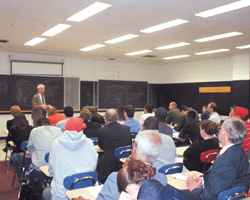Afghanistan Former Ambassador Visits UMass

Former US Ambassador to Afghanistan presents why ?the glass is more than half full? in terms of US involvement there. He spoke at UMB on October 8.
October 16, 2002
In a recent presentation to a UMass Boston International Relations class, former US Ambassador to Afghanistan, Charles F. Dunbar, detailed the political and diplomatic processes that have been underway in Afghanistan over the past year. He also briefly talked about how the success of, and satisfaction with, the interim government there could have implications in the impending attack on Iraq. Dunbar described what amounts to two wars that the United States has been fighting in Afghanistan. The first war being overthrow the Taliban and to secure the country against al-Qaeda and other like-minded terrorists, and the second, which Dunbar spent most of his time discussing, involves securing an acceptable authority in the country and preventing “warlords” from regaining power. The Office of the Provost and Vice Chancellor for Academic Affairs sponsored the October 8 presentation.
In response to the events of September 11, 2001, the United States, along with several other UN countries, began an effort in October 2001 to overthrow the Taliban regime and restructure the government in Afghanistan.
Dunbar began his lecture by giving background on the various ethnic groups comprising the population of Afghanistan. He said that while Afghanistan is ethnically diverse, “it is a country which is very much cohesive, and yet wants to fight within itself.”
He went on to detail what aspects of the current UN mission in Afghanistan have been successful. According to Dunbar, “… the essential point to keep in mind, and why I say the glass is more than half-full, is because what has happened in the last year cannot be regarded as a failure.” Because, Dunbar says, the US was “crucial in the overthrow of the Taliban regime, and of denying Afghanistan as a sanctuary to al-Qaeda.” He went on to say that “the degree of high-tech that we brought to this conflict, was something that the world had never seen before,” and “the tech is so much higher than it was in the Gulf War, the last time we fought in a major way, that there really is no comparison.”
Dunbar spent a few minutes recommending and summarizing an article, written by Mark Bowden, featured in the Atlantic Monthly (November 2002). That article talks about how, as Dunbar said, “to make a crude pun, the Afghans were blown away” by the superior military power of the United States Special Forces. Dunbar was referring to Afghans who were working alongside the US forces, who were impressed by the military ability of the US. “I think this degree of high-tech has had an enormous impression on the Afghans, and there is this sense that American military might is not to be trifled with,” Dunbar continued. He then discussed the political processes that led up to the instatement of the current government in Afghanistan.
In November 2001, Afghans, from inside the country and from out, gathered in Germany and “hammered out an agreement,” part of which established an interim authority. Dunbar said that “the political process which was outlined calls for the creation, first of an interim authority and then a transitional administration, to speak in United Nations gobbledy-gook.”
Hamid Karzai, a member of the Pushtun ethnic group, was chosen to head the new government. In 1994, the Taliban government offered Mr. Karzai the role of Ambassador to the United Nations. He refused. Karzai was involved with the Taliban in the early 1990s, but reportedly broke from the regime when he suspected that Taliban officials were responsible for the murder of his father. Dunbar seemed sure that any connections Karzai has had with the Taliban in the past would have been part of an effort to change that government from the inside out.
The group that chose Mr. Karzai was, admittedly, not a fully elected body but was made up of 1500 people “that were chosen, locally, within the country, to come together and have Mr. Karzai become the head of that authority.” Dunbar explained that Pushtun leaders have historically held a particular role for their group. Once elected, they are expected to basically go up to Kabul and get money from the outside world to stimulate the overall economic growth of the country.
“Karzai is clearly going to preside over the country during this transitional phase in which there will be a constitution written, and there will eventually be elections, the Good Housekeeping seal of approval for most governments that the United States is going to support, and everybody, presumably, would live happily ever after,” Dunbar said.
Dunbar expressed his dissatisfaction with the idea that there isn’t much money getting into Afghanistan and that the West isn’t doing enough. Dunbar believes that the $1.1 billion in foreign aid, from the US and other countries, “has been instrumental in feeding people, who did not have access to regular food supplies, and it has gotten a framework together, under which it could eventually become a government.” Dunbar made sure to clarify, “it is not fair to say that the Afghan interim administration is yet a government. It’s a government, sort of, in waiting.”
The United Nations sees its mission not as running Afghanistan but sort of getting them back on their feet, “but always with the view of handing over authority to Afghans as soon as they are capable of taking it,” Dunbar stated. Currently such organizations as UNICEF and the World Health Organization are working with the interim administration.
Dunbar admitted that his “glass is more than half-full” vision of the current situation in Afghanistan “runs very counter to what you see in the press.”
“Almost every story you see about Afghanistan that you see is describing how dreadful it is, and there is little sense of what is going on quietly, and that does not make such interesting copy, as the more negative aspects of the country,” the former ambassador stated.
Although Dunbar made it clear that security is still a large issue in the new Afghanistan he said that “there is the beginning of the establishment of security forces” there. The U.S. is building an Afghan army, Germany is taking responsibility for the police force, and Japan has committed to carry out de-mining operations. He went on to say that while security has improved, it doesn’t really extend past Kabul, leaving the countryside vulnerable to what he referred to “warlords.”
Such warlords present President Karzai with the possible problems of in-fighting and periodic clashes, which will continue, according to Dunbar, until the central authority can get some control over the situation. A difficult balance must be attained, Dunbar explained, “it has been recognized, clearly, that Afghanistan needs to be rebuilt. That you cannot leave this country in a state of chaos, having overthrown its government, you need to come in to participate in an effort to rebuild it.”
Dunbar sees the current “spirit of resistance to Kabul, and to the United States” as extremely problematic in the case of a war on Iraq. If that spirit grows, Dunbar says “that is very, very bad news for the Afghan government in the short run. It is also bad news for the United States in the not-too-much-longer run, because, if it is to be perceived in a Muslim world that the United States destroyed a government, that there is not much good going on there now, and that the United States has quote abandoned unquote Afghanistan to its fate, as it did after the end of the Soviet occupation, then it is going to be very hard for us as we attempt to pursue our war on terrorism elsewhere in the Middle East.”
Dunbar concluded his remarks by saying that the perception that the United States has not been doing our job in Afghanistan is unfair because the US has been among the leading contributors to $1.1 billion mentioned earlier in his talk. “But, if we cannot help the rest of the international community make this country work, then we are going to have a strike in Iraq which is going to be perceived as yet another effort of the West to get the Muslim world.” Dunbar feels that if the Muslim world perceives an Iraq strike in the above terms “our ability to win the war on terrorism, in the long run, will be compromised.”





















































